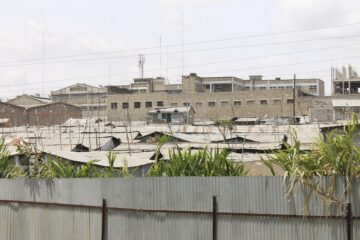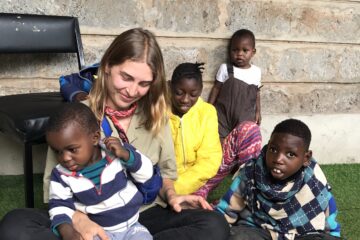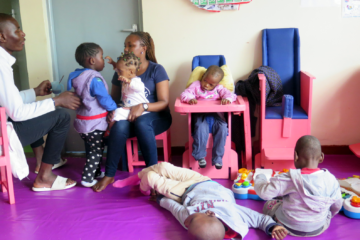10 euros – What is just enough for 1 or 2 lunches in our country enables the Child Destiny Foundation in Kibera to feed for a whole month. Rice and ugali each cost a few euros per kilo – but a small portion is enough to fill the stomach well. The menu of the day and therapy center is always fixed in advance: on Mondays, Wednesdays and Fridays there is ugali, a grain porridge made from corn flour, without which Kenyans can hardly imagine life. If you mention that there is no Ugali in Europe or that it is very difficult to find, the reaction is usually a wordless amazement, followed by an incredulous shake of the head and the statement "I would starve to death immediately!". Ugali is actually very filling - a small fistful and the hunger is satisfied. And that for little more than 1 euro per kilo. Ugali is accompanied by either kale (“Sukuma wiki”), eggs with tomato, or omena, dried freshwater fish from nearby Lake Victoria, which are rich in omega 3 fatty acids, vitamins D and B12, as well as minerals. A kilo of this superfood is available for less than 5 euros. Green cabbage is particularly cheap – a kilo costs the equivalent of around 50 cents. Instead, you pay a little less than 15 cents per egg. On Wednesdays, in addition to ugali, there is also mrenda, a typical Kenyan leafy vegetable with a slimy consistency, which is rich in iron, vitamin C and calcium. A large bundle of them hardly costs more than 20 to 30 cents. With only 10 euros you can get quite a long way.
On Tuesday and Thursday there is always rice instead, which the two childminders Lydia and Sylvia prepare with love. A different side dish is always served with it. The soy protein pieces “Sossi” are particularly good, and with their meaty and juicy texture they are real protein bombs. They are prepared with tomatoes and onions, which are steamed in a pot over a low flame. A 90g pack is available for less than 40 cents. You can also add white cabbage, which can be bought at the market for less than 50 cents per kilo. Mung beans or yellow beans serve as alternative side dishes to rice. They are bought dried by the kilo and are spread out on cloths in the sun a few days before the day center to get rid of beetles and other insects that are in between. These beans cost little more than 1 euro per kilo, but they can be used to prepare many portions of protein-rich dishes.
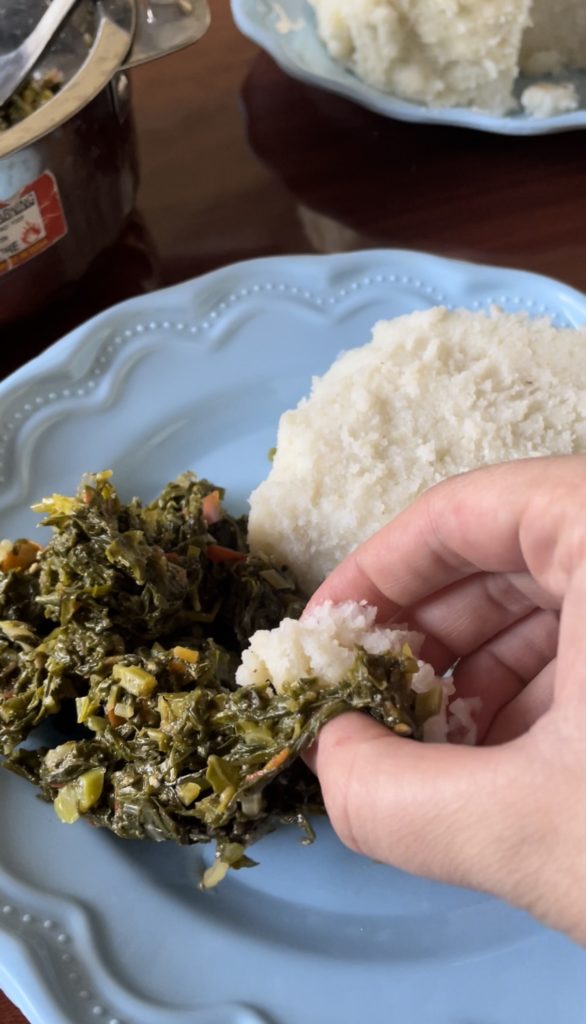
Due to the strong inflation, which was mainly driven by the corona pandemic and the war in Ukraine, the prices of many foods have tripled in a very short time. You could buy cooking oil for just over 1 euro per liter. In the meantime, you pay a liter price of over 3 euros for this. For the employees of the Child Destiny Foundation, this means that savings must be made at every turn. Food with a lot of oil is only prepared on special occasions. Special dishes such as mandazi (a form of sweet, fried cardamom bread) are a rare treat that bright-eyed children pounce on and munch on in no time. However, the cooking itself is also expensive: This is usually done with the help of a 6kg gas bottle, which has to be refilled every 3 weeks. At the end of last year, this still cost 5 to 6 euros, now you pay over 12 euros.
If you talk to the mothers and families of the children, existential fears are not uncommon either. The gratitude and appreciation towards the Child Destiny Foundation is all the greater that the children get a fixed warm meal at least during the week. The situation is different for those children with disabilities who have to stay at home due to poor connections and a difficult living situation. To the seemingly innocent question “What are you having for lunch at home today?” the answer is sometimes just a shrug and the comment “We don't have the money to go shopping today. I have no idea what's for dinner." For us people from countries in the Global North, this is an unimaginable scenario. Of course, inflation doesn't stop at us either. You have to cut back on leisure activities, sometimes forgo the good after-work drink and before the approaching winter you get cold feet just at the thought of the heating costs. But don't know if and when you'll have your next warm meal in your hands? Fortunately, hardly anyone in Austria has to deal with this fear.
However, high price volatility is not a new phenomenon in Kenya. Over the past 62 years, the consumer price index has ranged between -0.2% and 46.0%. Overall, prices have risen by an exorbitant 29,000% since 1960. In other words, a product that cost 100 ATS in 1960 will cost an impressive 29,000 ATS at the beginning of 2022. For comparison: In Austria, the price increase in the same period is "only" 603.5% (source: The World Bank). There are many reasons for this persistently high inflation. A key factor, for example, is the weak currency in combination with the high import ratio, which makes the country very vulnerable to external shocks. Due to the fact that the Kenyan private economy is hardly developed, many products have to be bought in from outside - mainly mineral fuels, industrial machinery, vehicles, iron and steel, plastics and grain. FAO figures, for example, show that Kenya imports nearly two-thirds (86%) of its wheat needs; the majority from Russia and Ukraine. So it's no wonder that food prices have risen so rapidly as a result of the Ukraine war.
However, the trade relationship with China is also problematic, especially in relation to the constantly growing mountain of debt that has accumulated in connection with huge infrastructure projects financed by China. It remains to be seen whether the projects implemented in this way, such as the Nairobi Express – an expressway that opened in May 2022 and connects the city center with Jomo Kenyatta International Airport – will also benefit the masses. At least only a small proportion of the population can afford the high toll
which also gave the street the nickname "road for the rich" (translated: "road for the rich"). Incidentally, it was built on the ruins of the Mukuru Kwa Njenga slum, which was leveled to the ground for this purpose. The government sees the 40,000 people made homeless by the construction as collateral damage. The residents apparently got three days' notice before their house was destroyed by a bulldozer. The project also received a lot of criticism because, at almost 670 million euros, it is the most expensive road in Kenya and went well beyond the originally set budget. If you ask the residents of Nairobi, the only answer you often get is that these extra expenses are said to have ended up in the pockets of a few politicians.
Speaking of corruption and mismanagement: These are also seen as significant drivers of inflation, since some imported goods are overpriced and/or of inferior quality. Earlier last year, President Uhuru Kenyatta noted that 2 billion shillings ($20 million) are lost every day to corruption, equivalent to about 7% of gross domestic product on an annual basis. All of this is exacerbated by a very lax competition policy that leads to cartels artificially inflating prices. And as a result of the Corona crisis, the government also significantly increased taxes on everyday household goods such as cooking gas, fuel and groceries last year. And then there is global warming, which has led to extreme droughts in large parts of the country. The disappearance of domestic products causes a shortage in supply while demand remains the same, driving prices even higher. In addition, the spread of commercial fish farming in Lake Victoria poses a further risk, as the habitat of native species such as Omena is slowly disappearing as a result. As a result of uncontrolled overfishing, fear of depletion of fish stocks is spreading. And the prices keep going up again. All this while two-thirds of the population live below the poverty line of 3.2 euros a day (source: The World Bank).
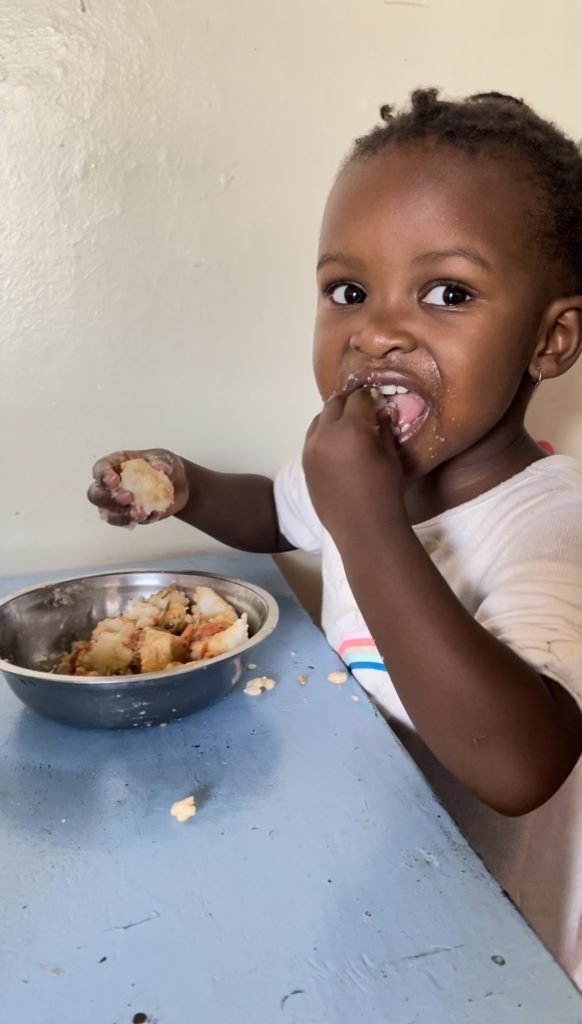
Although Kenya has been marked by perpetual inflation, uncertainty and turmoil, recent developments are extremely alarming. Food prices in particular are currently at an all-time high. But fuel and energy costs are also higher than ever. In order to further advance the work of the Child Destiny Foundation, one thing is clear: every cent counts. Even the smallest donation can make a difference. It only takes 10 euros to feed one of the 24 children with disabilities that we care for in the day and therapy center in Kibera for a whole month. And there is even some left over to cover the transport costs to and from the center. Just one cinema visit less per month and a child in Nairobi will be able to lead a dignified and healthy life! We, the affected children and their families are grateful for every euro.
